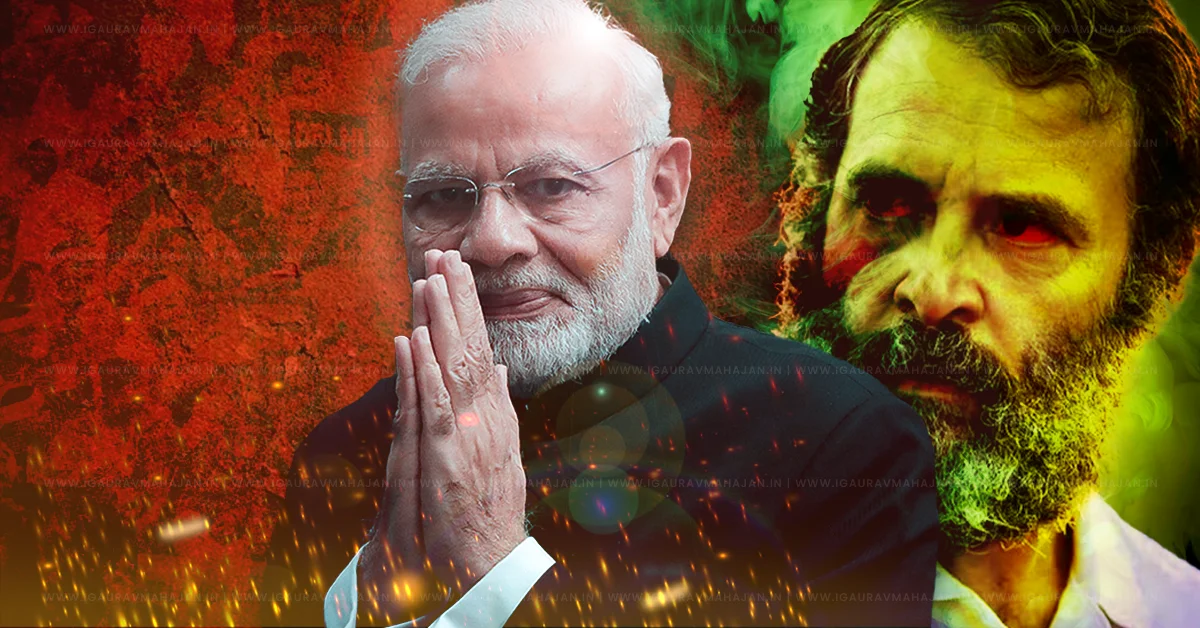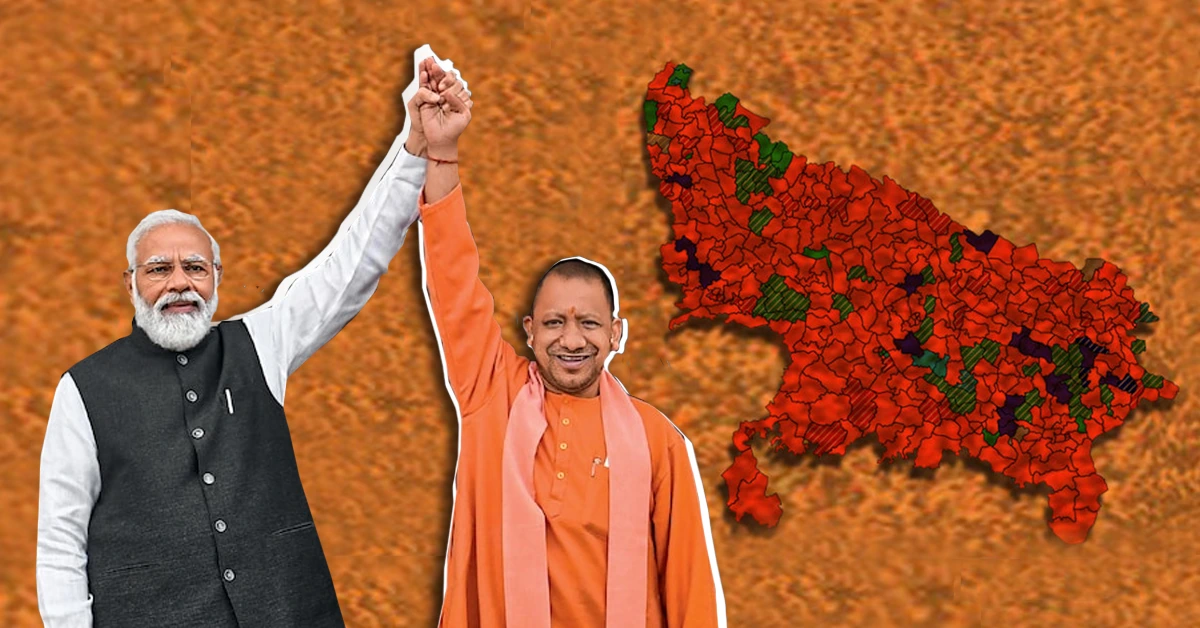The deceitful fabrication of narratives, like the one we are seeing on Aarey, to stall critical development projects is not just hurting India’s growth story but harming honest environment concerns as well.
- July 6, 2023
- 15 Mins Read
Ek Devendra Fadnavis Kya Karega…
Devendra Fadnavis rises as a powerful force in Maharashtra politics, defying Supriya Sule’s mockery. His astute calculations secure significant victories, fragmenting the NCP and wreaking havoc on the MVA government. Fadnavis’ strategic edge and political finesse solidify his position as an unrivaled king in Maharashtra’s political landscape.

click play to listen to the article
यः सर्वदा द्वेषं धारयति, स एकः मधुरहीनो मधुकरः विचलति।
The one who harbors constant negativity goes astray like a bee without honey
Devendra Fadnavis has once again proved he is the man with a strategic edge and political finesse, capable of outmaneuvering even the most influential and adept political figures, freezing his position as a formidable force in Maharashtra’s political landscape.
Ek Akela Sab Par Bhari: “Ek Devendra Fadnavis Kya Karega” quipped Supriya Sule mocking Devendra Fadnavis. Since then, Devendra Fadnavis achieved a significant victory in the 2021 Pandharpur bypoll, securing a seat that BJP had previously been unable to win. It was due to Devendra Fadnavis’ astute calculations that the BJP gained additional seats in the Rajya Sabha and MLC polls, successfully attracting members who had previously supported the Maha Vikas Aghadi (MVA) government. In 2022, Eknath Shinde made the decision to depart from the Uddhav Thackeray-led MVA and join forces with Devendra Fadnavis to form a new government. Then, in a highly dramatic turn of events reminiscent of the early morning of 2019, Ajit Pawar once again assumed the role of Deputy Chief Minister of Maharashtra. This time, his decision led to the fragmentation of the Nationalist Congress Party (NCP) and effectively wreaked the MVA as he once again allied with Devendra Fadnavis. Supriya Sule’s words of mockery towards Devendra Fadnavis proved to be drastically wrong, as his subsequent achievements and strategic moves demonstrated his political prowess and ability to secure significant victories, solidifying his position as the unrivaled king of Maharashtra politics, standing tall and unchallenged in his dominion.
Time will tell whether Ajit Pawar has the blessing of Sharad Pawar or not ― or maybe we’ll never know. But one thing that we know and can be sure of is that Devendra Fadnavis has outwitted the fox himself. The man considered to be the nucleus of opposition unity and the thread binding the MVA in Maharashtra has been forced to support the BJP. All those googlies seem to have stumped the bowler himself. Devendra Fadnavis has once again proved he is the man with a strategic edge and political finesse, capable of outmaneuvering even the most influential and adept political figures, freezing his position as a formidable force in Maharashtra’s political landscape.
The Breakup: NCP’s history of attempts to align with BJP is not new. In 2014, Sharad Pawar held discussions with Amit Shah and Narendra Modi to join the NDA coalition. However, BJP did not accept Pawar’s demands, and the talks did not materialize. In 2017, Pawar made an offer to BJP to become part of the NDA government at the center and the Devendra Fadnavis-led government at the state level. The condition was that BJP should end its alliance with Shiv Sena. BJP declined the offer. In 2019, Sharad Pawar engaged in talks with BJP, even finalizing the portfolio distribution, but he eventually backed out at the last moment. Once again, in 2022, prior to Eknath Shinde’s swearing-in as Chief Minister, all NCP MLAs wrote to Sharad Pawar urging an alliance with BJP.
Sharad Pawar’s actions in 2019 led to a profound sense of betrayal, particularly for Ajit Pawar, far outweighing the impact on Devendra Fadnavis. Ajit Pawar experienced a deep sense of humiliation and disappointment as a direct outcome of those events. It is believed that Ajit Pawar was willing to proceed with the floor test to demonstrate that he had sufficient support. He had expected 38 NCP legislators to back him up. Four of them had already reached Haryana to escape from Sharad Pawar’s pressure. However, Devendra Fadnavis declined Ajit Pawar’s proposal, citing that the timing was not appropriate for such a significant action. The seeds of mistrust between Ajit Pawar and Sharad Pawar were planted during that time, and the elevation of Supriya Sule might have served as the final trigger in their strained relationship.
The decision to form an alliance with Ajit Pawar has been a carefully considered move, with indications of discussions between Ajit Pawar and the BJP dating back to as early as March 2023. The dramatic resignation episode of Sharad Pawar might have been orchestrated to diminish Ajit Pawar’s influence by instilling fear among the MLAs and showcasing Sharad Pawar’s continued control over the party.
However, the decision to form an alliance with Ajit Pawar has faced intense criticism from two different angles. Firstly, there are BJP supporters who believe that the party has compromised its moral principles and betrayed their trust. On the other hand, the opposition is experiencing a significant meltdown, expressing strong disapproval towards this unexpected alliance.
BJP is "a party with a difference" not because of its alignments with individuals from different ideological backgrounds, but because of its conviction to fulfill its core agenda despite of its alignments with individuals from different ideological backgrounds.
Criticism from BJP Supporters: The viewpoint expressed by some BJP supporters is that the party no longer distinguishes itself as a “party with a difference”; there is a belief that the party has deviated from its original ethos and no longer embodies the principles of its founding members such as Syama Prasad Mukherjee and Atal Bihari Vajpayee. An important aspect for supporters of the BJP to understand is that the party’s claim to being a “party with a difference” is not based on its alignment with individuals from different ideological backgrounds. Rather, it stems from the party’s steadfast commitment to upholding its own ideology while forging alliances with those who hold different beliefs. This conviction to pursue their own ideology amidst such alignments is what sets the BJP apart and contributes to its distinctive identity.
It is important for BJP supporters to grasp that when people align themselves with the party, it is the BJP that brings about change in them, rather than being influenced by them. The BJP’s unique ideology and principles have the power to shape and mold individuals who become part of the party, not vice versa. BJP’s association with the PDP and the subsequent abrogation of Article 370 is a classic example of how the party doesn’t compromise on its core agenda.
In their quest to defeat Indira Gandhi, Atal Bihari Vajpayee and the Jana Sangh forged alliances with various political figures, despite their contrasting ideologies. The Jana Sangh, which later transformed into the BJP, had associations with Mulayam Singh Yadav, Lalu Prasad Yadav, and even with communist parties. Vajpayee, in his pursuit of support, sought alliances with individuals such as Mayawati, Jayalalitha, Karunanidhi, Mamata Banerjee, and Nitish Kumar, who held divergent views from the BJP. Despite the BJP’s strong reservations and previous vehement attacks on these individuals, challenging circumstances compelled them to form alliances with them. If the BJP managed to maintain its identity as “a party with a difference” throughout those alliances, there is no reason why it can’t continue to do so after forming an alliance with Ajit Pawar.
When BJP supporters criticize the party for its alliances, it is important for them to remember that securing a majority in the Lok Sabha alone is insufficient. The BJP requires a majority in the Rajya Sabha, and not just a simple majority, but a two-thirds majority, to effectively implement its agenda. It is worth recalling that the BJP started with only 46 Rajya Sabha seats in 2014, while a majority requires 123 seats and a two-thirds majority necessitates 164 seats. Achieving close to 100 seats for the BJP and nearing a majority for the NDA has been a painstaking effort spanning almost a decade. It is crucial to recall the instances where important bills like land bills and farm bills faced challenges in passing due to the dynamics of the Rajya Sabha. The composition of the Rajya Sabha played a significant role in shaping the outcome of these bills. The hurdles faced in obtaining the necessary support highlight the importance of securing a majority in Rajya Sabha to effectively drive the legislative agenda. The correlation between the increase in BJP’s seats in the Rajya Sabha and the progress made in fulfilling its core agenda is evident and difficult to overlook. The party’s ability to achieve significant milestones such as the abrogation of Article 370, the enactment of the Triple Talaq law, and the implementation of the GST showcases this pattern. The strengthened position in the Rajya Sabha has provided the BJP with the necessary support and leverage to advance its key objectives effectively.
In the current circumstances, one must operate within the existing situation rather than simply hoping for an ideal scenario. The BJP aligning with parties that hold opposing ideologies may not be an ideal situation, but it is the only viable option for the party to pursue its agenda. This is an agenda that no other political party is likely to undertake.
In their quest to defeat Indira Gandhi, Atal Bihari Vajpayee and the Jana Sangh forged alliances with various political figures, despite their contrasting ideologies. Despite the BJP’s strong reservations and previous vehement attacks on these individuals, challenging circumstances compelled them to form alliances with them. If the BJP managed to maintain its identity as “a party with a difference” throughout those alliances, there is no reason why it can’t continue to do so after forming an alliance with Ajit Pawar.
Criticism from Opposition: Rank opportunists and mandate stealers have absolutely no right to lecture the BJP. The very individuals who are now attempting to preach about morality were shamelessly siding with the SS-Congress-NCP alliance, which mercilessly betrayed the original mandate given to the BJP in Maharashtra. Their hypocritical actions and alliances expose their lack of principles and integrity, making their moral lectures utterly hollow and devoid of any credibility.
The opposition, constantly hurling accusations at the BJP for being a “washing machine,” hypocritically operates the world’s largest political laundromat. Their actions speak louder than words. Just take Arvind Kejriwal, who has shamelessly accused every politician of corruption, threatening them with imprisonment. Yet, over the course of a decade, he has shamefully embraced and befriended those very individuals he once vilified. And then there’s the Congress, led by Rahul Gandhi, gallivanting abroad and cozying up to those actively engaged in anti-India activities, while their own Mani Shankar Aiyar shamelessly begs Pakistan for help in toppling Modi from power. The opposition, with their glaring double standards and questionable ethics, are the last ones who should dare lecture the BJP on political morality.
Opposition Unity: The opposition parties are resolute in their determination to overthrow the BJP in the upcoming 2024 elections, aiming to prevent Prime Minister Modi from making history. The success of their alliance holds significant stakes for several political careers. In particular, former Congress president Rahul Gandhi faces an uphill battle in convincing even sympathetic Congress supporters that he possesses the capability to challenge Modi’s political dominance. A third consecutive failure would raise serious doubts about his relevance, but also further exacerbate the dwindling fortunes of the Congress. Given these circumstances, the opposition is likely to resort to unethical tactics in their pursuit of power.
The timing of Ajit Pawar’s revolt has severely fractured the unity of the opposition, dealing a significant blow to their plans of mounting a robust challenge against Narendra Modi in the 2024 Lok Sabha elections. By attracting influential figures like Ajit Pawar to their side, the BJP has effectively diminished the prospects of the opposition alliance and bolstered their own position. This development substantially enhances the likelihood of the BJP-led alliance securing a comfortable majority in Maharashtra, significantly contributing to their overall success in the upcoming Lok Sabha elections. Behind this stress on winnability is a bigger instinct at play: one has to last in power to make lasting changes, achieve long-term goals, and leave a mark in history.
Idealism vs Pragmatism: To maintain political correctness, ethics, and morality, it is important for all parties involved to demonstrate similar qualities. However, over the years it has become clear that the opposition aligned against the BJP lacks any such admirable attributes. The opposition expects BJP to be a party of saints, a party of subservient individuals who grovel at their feet in their attempt to make India a developed nation, while they themselves seek help from Pakistan and Soros-like anti-nationals to remove Narendra Modi from power.
Idealists often possess extensive knowledge about politics but lack a true understanding of its dynamics. They resemble gardeners who possess in-depth knowledge about flowers but struggle with the placement of a vase in a hall. While idealists view the goal of politics as bringing about change, the truth is that for pragmatists, the primary objective is attaining and retaining power. It is through the exercise of power over an extended period that tangible transformations can be achieved.
The sad truth is that clean politics will remain an elusive dream as long as the current opposition continues its unethical tactics. To bring about a transformation, the BJP must unleash its full force to obliterate these opponents who are playing a dangerous game of survival at the expense of the nation. Only by decisively crushing their deceitful maneuvers can India hope to pave the way for a fair and transparent political landscape.
The BJP’s ability to overcome the psychological hurdle of strategically bending its own rules to outmaneuver the opposition without compromising its core political ideology is commendable. Transformative power only comes with being in power for an extended period. And to maintain a strong grip on power, it becomes necessary to embrace pragmatism, even in its most unpalatable forms.
That is why it is imperative for the BJP to secure a resounding victory in the 2024 elections. By doing so, they can safeguard the progress made and ensure the continuation of their envisioned reforms, preventing a potential rollback of policies that could hinder India’s growth and development. Winning in 2024 is crucial to uphold the principles and ideologies that align with the aspirations of the people and to steer the nation towards a path of prosperity and stability.
Arvind Kejriwal can be seen making promises to the people, only to break them later. He had claimed to be a people’s leader and vowed to behave in a way that would benefit the people, but now appears to be doing the opposite. Kejriwal has also been seen giving advice and guidance to even the President of India, but now he himself seems to be behaving in a manner that is contrary to his own advice. These videos raise questions about Kejriwal’s credibility as a leader and his ability to keep his promises to the people.
Share this article:
Leave a Comment
Recommended For You
Today, there exists a group of perpetual critics who seem to have mastered the art of opposing every decision made by Prime Minister Narendra Modi. For these individuals, their preconceived notions and staunch allegiance to a particular ideology cloud their judgment, rendering them unwilling to objectively assess the merits of →Read More →
Regardless of what Congress led narratives may claim, the reality is clear: Narendra Modi has won. Despite facing an onslaught of deceit and malice from the Congress, Modi defied all odds and secured a healthy majority and emerged victorious!
BJP's 2019 election victory is the victory of Indians for a New India. It is the victory of grace, dignity and a commitment to work towards a country we want to see flourish, thrive, grow and compete with the best in the world. We are, Vijayi Bharat.
The latest election results have also established that a good majority of Indians perceive Modi to be a man they can trust, a man who can bring about development, a man who can bring in change, a man who can transform their lives for the better.
Between choosing the high moral ground and the practical path, the Bharatiya Janata Party (BJP) chose the practical one by aligning with Ajit Pawar. To blame the BJP for not choosing the moral high ground while giving a clean-chit to others for playing dirty politics is nothing but hypocrisy.
India stands transformed under Modi’s leadership, achieving milestones in infrastructure, security, and economic growth once neglected under Gandhi rule. Yet, persistent pessimism blinds us to this progress. To secure India’s future, voters must embrace decisive leadership and reject divisive dynasties.
A New India started taking shape under the leadership of Narendra Modi. An India that came out of the cusp of indecisiveness and apathy, to a New India testified by the spirit of change.
HMV, His Master’s Voice points towards an ecosystem which creates narratives for their political masters — leaders of Sharad Pawar’s NCP. The HMVs have a single-point agenda: to discredit Devendra Fadnavis at every forum, regional and national.
The rabble rouser is not the Yogi, but the hate mongering journalists and editors who seek to demean the verdict of the masses. Yogi Adityanath will prove to be a popular and effective Chief Minister, overseeing a regime of peace, harmony and justice for all.










